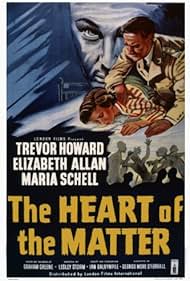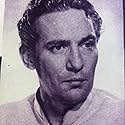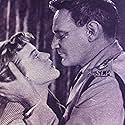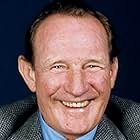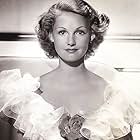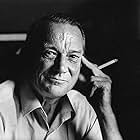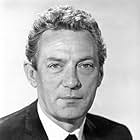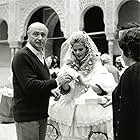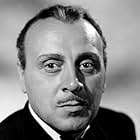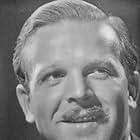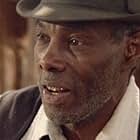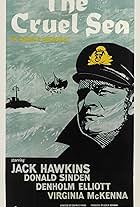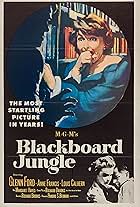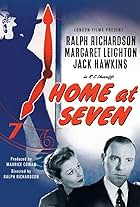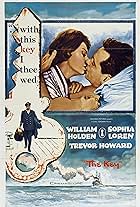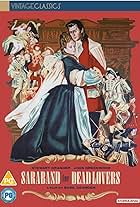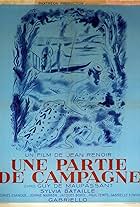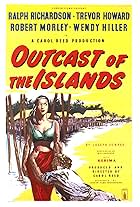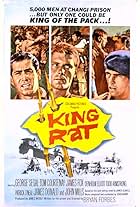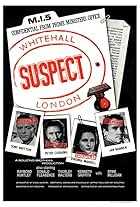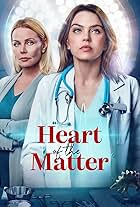An unhappily married British security officer stationed in Sierra Leone during World War II falls in love with a young Austrian woman and starts an affair. He soon starts feeling guilty.An unhappily married British security officer stationed in Sierra Leone during World War II falls in love with a young Austrian woman and starts an affair. He soon starts feeling guilty.An unhappily married British security officer stationed in Sierra Leone during World War II falls in love with a young Austrian woman and starts an affair. He soon starts feeling guilty.
- Nominated for 4 BAFTA Awards
- 1 win & 5 nominations total
Photos
Gérard Oury
- Yusef
- (as Gerard Oury)
Jack Allen
- RNVR Lieutenant
- (uncredited)
Peter Burton
- Perrot
- (uncredited)
Earl Cameron
- Ali
- (uncredited)
Saidu Fofana
- African Policeman
- (uncredited)
Judith Furse
- Dr. Sykes
- (uncredited)
John Glyn-Jones
- Harris
- (uncredited)
Colin Gordon
- Colonial Secretary
- (uncredited)
Jane Henderson
- Miss Malcot
- (uncredited)
Errol John
- African Policeman
- (uncredited)
- Director
- Writers
- All cast & crew
- Production, box office & more at IMDbPro
Storyline
Did you know
- TriviaThe novel from which this movie was adapted, drew upon author Graham Greene's wartime experiences in Sierra Leone, where he was employed by Britain's Secret Intelligence Service (MI6).
- Quotes
Harry Scobie: Besides, I like the place.
Commissioner: I believe you do. I wonder why.
- Crazy creditsOpening credits prologue: FREETOWN, 1942.
- ConnectionsFeatured in Dangerous Edge: A Life of Graham Greene (2013)
Featured review
Grahame Greene preferred to be called a 'novelist who happened to be a Catholic' rather than a 'Catholic novelist'.
That he was a master storyteller with a gift for characterisation is indisputable and 'The Heart of the Matter' of 1948 not only proved to be a best seller but has long since been regarded by the literati as one of his finest.
Brought to the screen five years later by a 'capable' director with a first rate cast, its themes of angst-ridden guilt, crisis of Faith, mortal sin, human frailty and failure would hardly be likely to appeal to the average cinema goer and so it proved. The paying public stayed away in droves.
The character of Harry Scobie, a deputy assistant commissioner in Sierra Leone is one of Greene's most complex characters. Described by his neurotic wife as a typical 'second man', as a 'coward' by his equally neurotic younger lover and by his superior as 'Scobie the Just', he goes to great lengths to achieve the well-nigh impossible task of not causing pain or suffering to anyone, even to God! Faced with this moral dilemma he decides to take the only way out.......
The makers of this have resisted the temptation to hire a Hollywood 'name' as Scobie and have cast Trevor Howard. He is absolutely mesmerising in the role and turns in what is arguably his greatest performance. His character's fall from grace is agonising to behold.
All of the performances are uniformly excellent and Maria Schell is at her most touching. The 'chemistry' between her and Howard is palpable.
The direction by George More O'Ferrall is solid but alas rather flat and uninspired.
The script is literate if not literal and the original ending has been changed in an attempt to make it more filmic.
William Golding described Greene as 'the ultimate chronicler of Twentieth Century Man's consciousness and anxiety.' There is a bit too much of both in the novel and any film version would struggle to be commercially viable.
It can still be enjoyed however by those few who recognise and appreciate fine acting.
That he was a master storyteller with a gift for characterisation is indisputable and 'The Heart of the Matter' of 1948 not only proved to be a best seller but has long since been regarded by the literati as one of his finest.
Brought to the screen five years later by a 'capable' director with a first rate cast, its themes of angst-ridden guilt, crisis of Faith, mortal sin, human frailty and failure would hardly be likely to appeal to the average cinema goer and so it proved. The paying public stayed away in droves.
The character of Harry Scobie, a deputy assistant commissioner in Sierra Leone is one of Greene's most complex characters. Described by his neurotic wife as a typical 'second man', as a 'coward' by his equally neurotic younger lover and by his superior as 'Scobie the Just', he goes to great lengths to achieve the well-nigh impossible task of not causing pain or suffering to anyone, even to God! Faced with this moral dilemma he decides to take the only way out.......
The makers of this have resisted the temptation to hire a Hollywood 'name' as Scobie and have cast Trevor Howard. He is absolutely mesmerising in the role and turns in what is arguably his greatest performance. His character's fall from grace is agonising to behold.
All of the performances are uniformly excellent and Maria Schell is at her most touching. The 'chemistry' between her and Howard is palpable.
The direction by George More O'Ferrall is solid but alas rather flat and uninspired.
The script is literate if not literal and the original ending has been changed in an attempt to make it more filmic.
William Golding described Greene as 'the ultimate chronicler of Twentieth Century Man's consciousness and anxiety.' There is a bit too much of both in the novel and any film version would struggle to be commercially viable.
It can still be enjoyed however by those few who recognise and appreciate fine acting.
- brogmiller
- Dec 21, 2020
- Permalink
Details
- Release date
- Country of origin
- Language
- Also known as
- Das Herz aller Dinge
- Filming locations
- Sierra Leone(made in Sierra Leone, West Africa)
- Production companies
- See more company credits at IMDbPro
- Runtime1 hour 40 minutes
- Color
- Aspect ratio
- 1.37 : 1
Contribute to this page
Suggest an edit or add missing content

